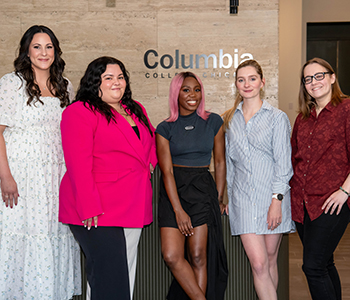
School of Communication and CultureJournalism and Communication Bachelor's Degree
- BA

Ready to kickstart your career in journalism and communication? Learn how to contribute intellectually, culturally, and creatively as skilled journalists and communication professionals. Our program pushes the boundaries of a traditional journalism and communication BA. At Columbia, you’ll apply foundational storytelling, media literacy, and production communication skills to solve real-world challenges through project-based learning and practicum projects. Students can also build their creative skills working for the award-winning “Columbia Chronicle” and college station WCRX-FM. You’ll leave Columbia having produced real-world projects, opening doors to a wide array of career fields, including journalism, public relations, nonprofit communication, civic/government careers and more.
Examples of Journalism and Communication Careers
The Student Experience
At Columbia, Journalism and Communication students start working on real projects from their first semester, developing a portfolio that impresses future employers.
Our professors bring extensive industry experience, having worked for news organizations such as “The Washington Post,” “Crain’s,” WBEZ, the “Chicago Tribune,” and “Chicago Sun-Times,” as well as national magazines and Spanish-language media.
Students have interned at renowned companies, including Leo Burnett, Report for America, Univision, and the “Chicago Tribune,” providing practical experience and professional connections.
Courses like Communication Essentials and Introduction to Journalism introduce you to fundamental skills, while also helping you begin creating a body of work.
Produce storytelling projects and communication campaigns ensuring your work is published across various platforms. Several classroom projects are published in Spanish.
The work you produce in your courses and for student media build a strong foundation for your portfolio, showcasing your capabilities to employers.
Showcase your skills in journalism and communication, gaining recognition for your talent, hard work and dedication
Engage with professional clubs focused on communication and journalism, where you can build your own community while also networking with peers and industry leaders.
Chicago is home to numerous local and national news organizations, as well as consumer and business-to-business magazines, broadcast outlets, and nonprofit news sources -- incubators for innovation and collaboration.

Career Readiness
Columbia’s Journalism and Communication program prepares you for a successful career with real-world experience and professional networking opportunities.
Hands-on classroom projects mimic actual industry practices, complemented by site visits to top agencies and organizations and our dedicated internship coordinators help you find meaningful opportunities that align with your coursework.
Connect with established professionals through workshops and events, leveraging Columbia’s strong alumni network.
ALumni Spotlight

24 in 2024
"24 in 2024" recognizes alumni from Columbia College Chicago for their professional achievements beyond their academic journeys. Learn more.
of 2023 grads are employed, enrolled in continued education, or pursuing their creative practice.